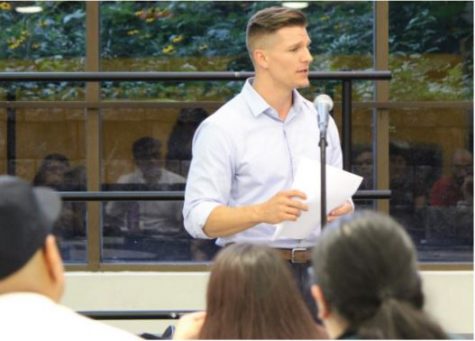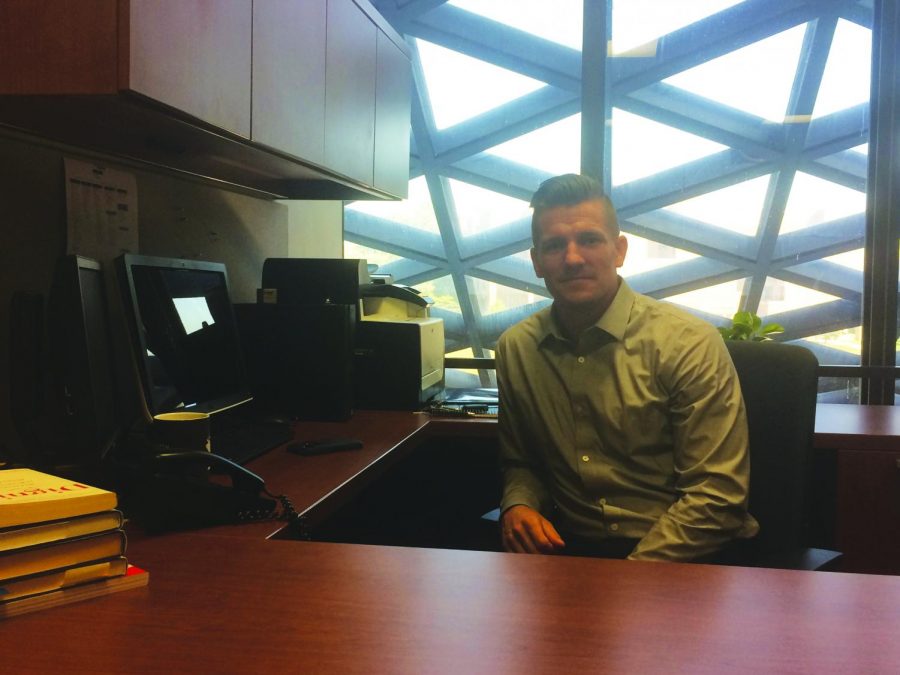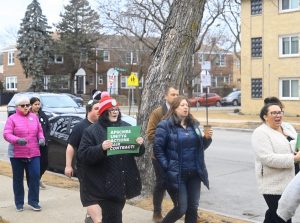Meet your new university ombuds
What is an Ombuds, and the Ombuds role on a university campus
Ombuds Tyler Smith sits in his office on the second floor of the Ronald Williams Library.| Photo by Grace Yu
October 8, 2019
If you have noticed a number of new staff hires around campus, you are correct that NEIU is finally (after budget cuts in recent years) getting around to refilling needed campus positions in order to sufficiently serve its student body. I sat down with Tyler Smith, the recently hired Ombuds who began at NEIU over the summer to discuss what an Ombuds is and what role an Ombuds fills on a university campus.
From a Swedish word that literally means “representative,” the university Ombuds is a confidential, informal, independent and impartial resource for the entire university community, including faculty, staff and students. Anyone can visit the Ombuds for any reason.
“There’s really not much that people cannot come to the Ombuds Office about,” said Smith. “If they’re feeling challenged by [something] either in the classroom setting or the workplace setting, the office is really here to be a resource to help people think through what their options might be for addressing the situation that they’re facing, what resources are available to them here in the university or beyond to help them address it and what kind of strategies, techniques, approaches they can consider in order to reach some sort of resolution.”
The Ombuds’ role can also be that of facilitation or mediation in situations of conflict between individuals or groups. An initial conversation can involve a discussion of goals and what someone may want to accomplish, e.g., whether the other party in a conflict ought to be brought in for further consultation. The Ombuds can also coach on conflict, building someone’s capacity for resolving conflict with various strategies. All visitation is voluntary. You may not drag someone else to the Ombuds office for mediation, and the Ombuds cannot force anyone to participate.
- Confidentiality is of course vital to this process. The Ombuds will not reveal any information shared except in circumstances where an individual may present a danger to others or him/herself.
- The Ombuds acts as a resource that is informal because he counsels with no formal complaint process. The Office of the Ombuds keeps no record on meetings (who or when someone comes in or any sort of content of conversations). In fact, everything stated in meetings with the Ombuds is kept off the record. This is distinct from a Title IX office on a university campus that is required to enforce federally mandated policies on higher education and uses a formal reporting process.
- Independence emphasizes that the role operates apart from the administration. The role is not part of any university department and reports directly to the Office of the President only on financial or budgetary issues.
- The Ombuds is considered an impartial resource because his role is that of a neutral resource for the entire university ecosystem. The Ombuds never takes sides in a conflict. He does not, therefore, arbitrate or advocate for one particular individual or group over another in a situation.
Recently, as an example, the Student Government Association (SGA) requested that Smith act as a mediator in the town hall they were hosting to discuss the campus’s invitation to presenters Donna Brazile and Sean Spicer for the Daniel L. Goodwin Distinguished Lecture Series in Sept. Both SGA and the President’s Office separately contacted Smith to participate in a subsequent town hall hosted by President Gibson after the lecture took place. In these settings, Smith was able to provide a neutral perspective. The larger, holistic Ombuds point of view facilitates for a conversation between multiple groups or sides to take place. This perspective possesses a more total, broader range of sight in such situations.
In a certain sense, the Ombuds is more of an independent consultant to the university than an employee working for its administration, especially when examining larger organizational conditions, or the broader conditions in which members of the university community face their challenges or conflict.
“I also have a responsibility here at the university to not just deal with the kind of individual situations that people bring to my office as if they are kind of isolated incidents,” explained Smith.

Smith mediating the recent SGA town hall. |Photo by Frannie Mendoza
“I have a responsibility of looking at the bigger picture, and trying to make sense of the patterns and the themes and the trends of the kinds of issues that people bring to my office, and give feedback to the institution, whomever that might be, whether it’s the president or other stakeholders, about those kinds of themes, patterns, trends and issues – systemic issues, if you will, structural issues, issues related to organizational climate and culture, the policies, the implementation of policies, and the consequences that they have, or how policies don’t necessarily align with what the institution claims to be its values.”
Finally, Smith also explained that the flip side of his role is to take a proactive approach. Aside from waiting for Northeastern’s community members to reach out to him, he performs outreach in the form of workshops and presentations so that we can build tools and skills and share or receive knowledge on conflict and mediation.
For example, Oct. is International Conflict Resolution Month, and the second Thursday of every Oct. is Ombuds Day. Smith will be giving an interactive exploratory workshop on Oct. 10 from 1 to 2 p.m. in Alumni Hall North (also listed on our Campus Life events calendar!).
The Office of the Ombuds is located in Room 216 of the Ronald Williams Library. The Ombuds is available for appointments with members of the university community in his office, at the Carruthers and El Centro campuses, off-campus or by phone. More detailed information can be found at: www.neiu.edu/university-life/ombuds-office.








